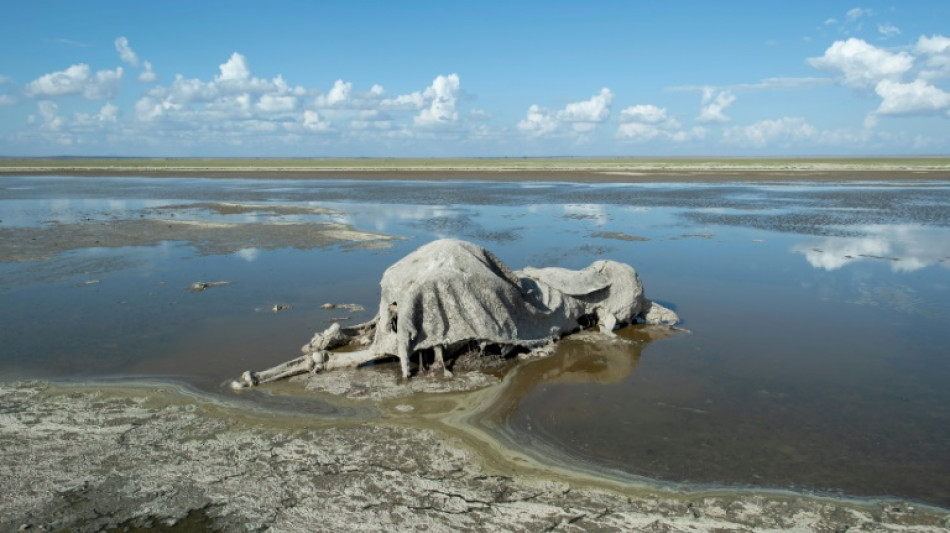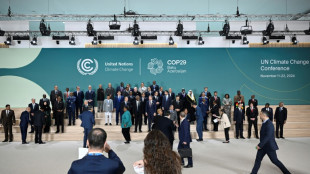
-
 Fear in central Beirut district hit by Israeli strikes
Fear in central Beirut district hit by Israeli strikes
-
Chinese film about Covid-19 wins Taiwan's top Golden Horse prizes

-
 Tuipulotu puts anger behind him as he captains Scotland against native Australia
Tuipulotu puts anger behind him as he captains Scotland against native Australia
-
Inter smash Verona to take Serie A lead

-
 Mass rape trial sparks demonstrations across France
Mass rape trial sparks demonstrations across France
-
Lebanon says 15 killed in Israeli strike on central Beirut

-
 Eddie Jones will revel in winding up England - Genge
Eddie Jones will revel in winding up England - Genge
-
Chelsea see off Leicester on Maresca's King Power return

-
 Storms bring chaos to Ireland, France, UK
Storms bring chaos to Ireland, France, UK
-
Berrettini gives Italy edge on Australia in Davis Cup semis

-
 Amber Glenn storms to gold in Cup of China
Amber Glenn storms to gold in Cup of China
-
High-flying Chelsea see off Leicester

-
 Climate-threatened nations stage protest at COP29 over contentious deal
Climate-threatened nations stage protest at COP29 over contentious deal
-
Families fleeing after 32 killed in new sectarian violence in Pakistan

-
 Ancelotti says 'ugly' to speculate about Mbappe mental health
Ancelotti says 'ugly' to speculate about Mbappe mental health
-
Failure haunts UN environment conferences

-
 Colapinto in doubt for Las Vegas GP after crashing
Colapinto in doubt for Las Vegas GP after crashing
-
Lebanon says 11 killed in Israeli strike on central Beirut

-
 Three arrested in Spain for racist abuse at Liga Clasico
Three arrested in Spain for racist abuse at Liga Clasico
-
Pope to skip Notre Dame opening for Corsica visit

-
 Tokyo police care for lost umbrellas, keys, flying squirrels
Tokyo police care for lost umbrellas, keys, flying squirrels
-
Neuville closes in on world title after Rally Japan recovery

-
 Jaiswal slams unbeaten 90 as India seize control against Australia
Jaiswal slams unbeaten 90 as India seize control against Australia
-
'Nice surprise' for Verstappen to edge Norris in Las Vegas GP qualifying

-
 Indian teen admits to 'some nerves' in bid for world chess crown
Indian teen admits to 'some nerves' in bid for world chess crown
-
Patrick Reed shoots rare 59 to make Hong Kong Open history

-
 Record-breaker Kane hits back after England criticism
Record-breaker Kane hits back after England criticism
-
Cameron Smith jumps into lead at Australian PGA Championship

-
 Russell on pole position at Las Vegas GP, Verstappen ahead of Norris
Russell on pole position at Las Vegas GP, Verstappen ahead of Norris
-
Philippine VP made 'active threat' on Marcos' life: palace

-
 Celtics labor to win over Wizards, Warriors into Cup quarters
Celtics labor to win over Wizards, Warriors into Cup quarters
-
Balkans women stage ancient Greek play to condemn women's suffering in war

-
 Nvidia CEO says will balance compliance and tech advances under Trump
Nvidia CEO says will balance compliance and tech advances under Trump
-
Grand Slam ambition dawning for Australia against Scotland

-
 Japan game set to leave England with more questions than answers
Japan game set to leave England with more questions than answers
-
Amorim's to-do list to make Man Utd great again

-
 What forcing Google to sell Chrome could mean
What forcing Google to sell Chrome could mean
-
Fears for Gaza hospitals as fuel and aid run low

-
 Anderson to Starc: Five up for grabs in IPL player auction
Anderson to Starc: Five up for grabs in IPL player auction
-
Big money as Saudi makes foray into cricket with IPL auction

-
 Budget, debt: Trump's Treasury chief faces urgent challenges
Budget, debt: Trump's Treasury chief faces urgent challenges
-
Trump names hedge fund manager Scott Bessent as Treasury chief

-
 Putin vows more tests of nuke-capable missile fired at Ukraine
Putin vows more tests of nuke-capable missile fired at Ukraine
-
Yin avoids penalty to keep lead as Korda charges at LPGA Tour Championship

-
 With favourites out MLS playoffs promise more upsets
With favourites out MLS playoffs promise more upsets
-
Trump to name hedge fund manager Scott Bessent as Treasury chief: US media

-
 Guardiola says 75 percent of Premier League clubs want Man City relegated
Guardiola says 75 percent of Premier League clubs want Man City relegated
-
'Unique' Netherlands beat Germany to reach first Davis Cup final

-
 Revamped PSG see off Toulouse before Bayern clash
Revamped PSG see off Toulouse before Bayern clash
-
France cruise past ill-disciplined Argentina


Drought, floods and sickness: Key takeaways from UN's water report
Billions of people experience water-related issues on a daily basis -- from contaminated drinking water, to droughts and floods -- with a UN report warning Tuesday that the risk of a global crisis is "imminent."
Here are some key takeaways from the UN Water forum, which published its report as the first major conference on the issue in nearly a half-century is set to get underway Wednesday in New York.
- Shortages -
Global water consumption has increased by about 1 percent per year over the past four decades.
To meet that growing demand, humans have been tapping more and more into groundwater, resulting in the depletion of between 100-200 cubic kilometers (26-52 trillion gallons) of reserves each year.
About 10 percent of the world's population lives in a country where water stress (the ratio of water use to water availability) is considered "high or critical," creating significant impacts on its availability for personal needs.
And according to a report issued Monday by the IPCC -- a UN panel of climate experts -- "roughly half of the world's population currently experience severe water scarcity for at least part of the year."
The World Bank estimates that climate change-exacerbated water shortages could cost some regions up to six percent of GDP by 2050 due to impacts on agriculture, health, income, and potentially forced migration or even conflict.
- Cities v. agriculture -
Agriculture makes up more than 70 percent of global water usage, but as city populations have continued to grow, "water allocation from agriculture to urban centers has become a common strategy to meet freshwater needs," the UN said.
But that's not likely to be enough. The number of urban residents threatened by water scarcity is expected to rise from 933 million in 2016 to between 1.7 and 2.4 billion in 2050, according to UN-Water, which projects that India will experience the most severe effects.
- Natural disasters -
As the planet warms, humidity in the atmosphere increases by about seven percent with each additional degree Celsius. That in turn leads to more rainfall, which is more intense and less regular.
Between 2000 and 2019, floods are estimated to have caused $650 billion in damage, affected 1.7 million people and caused more than 100,000 deaths, according to the report.
Warming also intensifies and raises the frequencies of droughts, which over the same period affected 1.4 million people and caused $130 billion in damage.
Together, droughts and floods account for more than three-quarters of the natural disasters impacting humans.
- Sanitation and hygiene -
In 2020, over one in four people around the globe still lacked access to safe drinking water, while 3.6 billion (46 percent of the population) lacked access to safely managed sanitation services, including the nearly 500 million who must resort to "open defecation."
In addition, more than 40 percent of domestic wastewater was not treated safely before being released into the environment in 2020.
Twenty-nine percent of the world's population (2.3 billion people) lacked basic hygiene services, including 670 million without any handwashing facilities.
At least two billion people drink water which has been contaminated with feces -- which can contribute to the spread of diseases such as cholera, dysentery and polio.
In 2019, 1.4 million deaths are estimated to have been caused by the lack of adequate sanitation and hygiene services.
Worries are also growing over other kinds of pollutants, such as chemicals and pharmaceutical drugs, pesticides, or plastics and nanomaterials.
- Ecosystem damage -
Pollutants are also threatening freshwater ecosystems, which are particularly affected by agricultural runoff.
These fragile ecosystems are "among the most threatened in the world," the report says, while highlighting the disappearance of more than 85 percent of wetlands.
"The loss of environmental services and biodiversity is expected to continue as natural landscapes are lost to cultivated land," the report says, noting that these transitions can result in the emission of greenhouse gases.
- Major investments needed -
While it is difficult to put a precise number on how much investment would be needed to achieve the UN's sixth "Sustainable Development Goal" of ensuring access to clean water and sanitation for all by 2030, a study cited by the report estimates that it would cost more than $1 trillion per year.
Just providing safe drinking water by 2030 would require a tripling of current investment levels, the report says.
O.Lorenz--BTB


